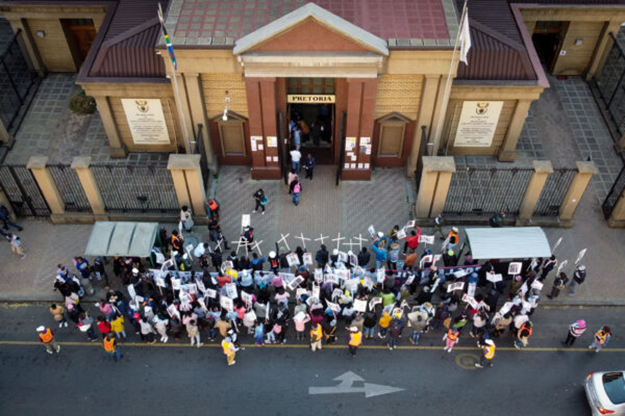
Government’s plans to procure more gas power pose risk of unjustifiable harm to the people of South Africa
According to a broad coalition of environmental and climate justice groups, government’s current plans to procure an additional 3000 megawatts of new gas power are vague, unnecessary and threaten the Constitutional rights of people living in South Africa.
Environmental and climate justice groups groundWork, the South Durban Community Environmental Alliance (SDCEA), Natural Justice and the Centre for Environmental Rights (CER), submitted objections to the National Energy Regulator of South Africa (NERSA) on plans proposed by the Minister of Mineral Resources and Energy on 25 August 2022 for Eskom to procure 3000 megawatts (MW) of gas power in Richards Bay.
This is over and above the 3000 MW of gas capacity provided for in South Africa’s electricity planning document – the Integrated Resource Plan for Electricity (IRP) of 2019, for which a Ministerial determination was issued in 2020, though procurement has not yet commenced.
The groups argue that the proposed determination is fundamentally unreasonable and irrational and procedurally inadequate. “As far as we know, this proposed gas capacity is not based on any energy modelling or informed by any impact assessments”, says Desmond D’Sa of SDCEA. In the wake of a new bout of load-shedding and South Africa’s worst load shedding year so far, the groups highlight that gas is not the solution to the electricity crisis.
Multiple experts agree that the role for gas, if anything, is not at a baseload or mid-merit capacity, as proposed by the determination. “Energy modelling shows that renewables are the quickest and cheapest way to get much-needed capacity onto the grid. By committing to harmful and expensive gas – government is displacing this much needed renewable capacity, and the most practical solution to SA’s loadshedding woes”, says Avena Jacklin, groundWork.
In particular, the civil society groups are concerned that:
· the public consultation process preceding the draft determination has, to date, been woefully inadequate, with no attempt made to consult directly with communities in Richards Bay where this gas power would be based;
· the draft gas determination that was made available for comment lacks key information and is not informed by any electricity needs and least-cost planning or crucial impact assessments, and is thus irrational and unreasonable;
· the draft determination, as it currently stands, is vague and ambiguous and fails to meet applicable legal requirements, for example, specifics as to who the generator or buyer of the power will be;
· the gas determination is in conflict with the law and Constitution in that plans to develop new gas power capacity pose unjustifiable harms to the people of South Africa and threaten their constitutional rights, and are not aligned with the legal requirements set out in the Electricity Regulation Act, 2006; and
· the gas determination appears to be tailor-made and retrofitted to Eskom’s authorised (though disputed) gas fired power station in Richards Bay.
The objections are endorsed by Earthlife Africa, The Green Connection, 350Africa.org, Oceans Not Oil, and Project 90 by 2030.
“This determination wilfully ignores all evidence that gas in the future electricity mix does not form part of a least-cost electricity plan for South Africa. Any gas capacity will simply add to rising electricity costs and further exacerbate inequality and the economic downturn in South Africa.” Gabrielle Knott, CER. “Rather, the DMRE and Eskom should be doing their utmost to urgently bring renewable electricity capacity onto the grid – this is aligned with evidence of credible least-cost electricity modelling and planning for South Africa as well as the health, wellbeing and a safer climate future for the people of South Africa”, adds Knott.
Challenge to Richards Bay Gas Power in Court
In August 2022, groundWork and SDCEA (supported by Natural Justice and represented by environmental law firm, Cullinan & Associates) were in the Pretoria High Court challenging the environmental authorisation (EA) granted to Eskom in December 2019 for the construction of a 3000 MW combined cycle power plant in Richards Bay. This landmark litigation marks the first time that a gas power plant has been challenged in a court in South Africa, and judgment is awaited. The parties have asked that the EA be declared unlawful and set aside based on inadequacies within the Environmental Impact Assessment (EIA) and due to the flawed public participation process that was undertaken. Developing this project will lock South Africa into long-term fuel cost commitments, the plant is neither needed nor desirable, and violates South Africa’s international climate change commitments.
In the litigation, Eskom argued that the need for and desirability of the plant was based squarely on the IRP. Despite this, an Erratum to the Consultation Paper explains that the proposed gas determination is not based on the IRP, but rather on a separate application by Eskom on 13 January 2022 for “the implementation of a 3000 MW Combined Cycle Gas Power Plant at Richards Bay”.
Melissa Groenink-Groves of Natural Justice explains that “Multiple expert reports have found that combined cycle gas power capacity is not needed in the next decade, and in particular, that a 3000 MW plant at Richards Bay is not needed. Instead, power procurement should focus on implementing renewable energy capacity to meet the needs of our people and to safeguard their environmental rights.”
The court papers also argue that the decision makers should have considered that renewable energy is an alternative fuel source. Moreover, any gas plant built in the 2020s will be scheduled to run well past any reasonable deadline for zero carbon emissions, and are likely to be abandoned as stranded assets long before they are paid off. “There is no reasonable basis for building baseload or mid merit gas plants when the technology and costs are clearly in favour of renewables and flexible generation” says Avena Jacklin of groundWork. “We no longer need to choose between clean and cheap electricity – clean energy is an affordable, healthy and feasible alternative.”
MEDIA ENQUIRIES
Lerato Balendran, Centre for Environmental Rights: +27 79 071 7442



